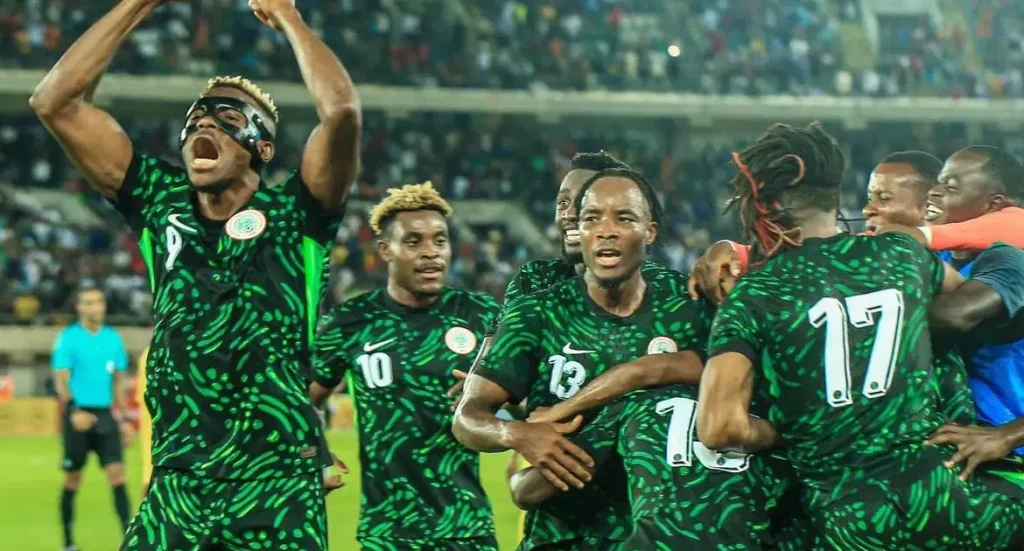Nigeria’s Super Eagles Continue to Falter in FIFA Rankings Amidst World Cup Qualifying Challenges
The Nigerian national football team, the Super Eagles, has experienced another setback in the latest FIFA World Rankings, dropping one spot to 45th globally while remaining sixth in Africa. This decline marks the second consecutive fall for the team, following their slip from 43rd to 44th in August. The consistent dip in rankings reflects the team’s ongoing struggles under Coach Jose Peseiro, particularly during their faltering 2026 World Cup qualifying campaign. This performance raises concerns about the team’s ability to secure a spot in the prestigious tournament and highlights the need for significant improvements in their overall performance. The Super Eagles’ recent results have been underwhelming, failing to secure decisive victories and exhibiting vulnerabilities that have been exploited by their opponents. This downward trend underscores the challenges facing the team and the urgency for a turnaround in their fortunes.
The Super Eagles’ slide in the rankings contrasts sharply with the progress made by several other African nations. Morocco continues to lead the continent, holding firm at 11th globally, buoyed by a string of impressive victories. Senegal, Egypt, Algeria, and Côte d’Ivoire complete the top five African teams, demonstrating the continent’s growing strength in international football. While these nations have shown consistent improvement and positive momentum, Nigeria appears to be lagging behind, struggling to maintain its position among the continent’s elite. This disparity highlights the need for Nigeria to reassess its strategies, address its weaknesses, and strive to emulate the success of its continental rivals. The current situation calls for introspection within the Nigerian football ecosystem to identify and rectify the factors hindering the Super Eagles’ progress.
South Africa’s Bafana Bafana, who held the Super Eagles to a 1-1 draw in June, have climbed to 55th in the world rankings, further solidifying their position in the race for World Cup qualification. This improvement by a direct competitor adds to the pressure on Nigeria to elevate their game and reclaim their standing as a dominant force in African football. The draw against South Africa exposed defensive frailties and a lack of attacking prowess, issues that need urgent attention to prevent further setbacks. The Super Eagles must rediscover their winning formula and demonstrate the resilience needed to compete at the highest level.
Lesotho, another African nation, has slipped to 153rd place, while Benin Republic, Nigeria’s upcoming opponent, has ascended to 93rd. This presents both a challenge and an opportunity for the Super Eagles. While facing a higher-ranked Benin Republic necessitates a strong performance, a victory could potentially boost their ranking and inject much-needed confidence into the squad. The upcoming match against Benin Republic is crucial for Nigeria to arrest their decline and demonstrate their capability to compete against formidable opponents. A positive result would not only improve their ranking but also instill belief in their ability to qualify for the World Cup.
Zimbabwe experienced the most dramatic fall in the rankings, plummeting nine places to 125th. This significant drop highlights the volatility of international football and the importance of consistent performance. Zimbabwe’s decline serves as a cautionary tale for Nigeria, emphasizing the need for sustained improvement and the avoidance of complacency. The Super Eagles must learn from the experiences of other nations and strive to maintain a steady trajectory of progress.
The latest FIFA rankings underscore the challenges facing the Super Eagles as they navigate a difficult World Cup qualifying campaign. While other African nations continue to rise in the global standings, Nigeria’s stagnation raises concerns about their ability to compete at the highest level. The team’s recent performances have been lackluster, characterized by defensive vulnerabilities and an inability to convert opportunities into goals. This trend must be reversed if Nigeria is to realize its ambition of qualifying for the World Cup and reclaiming its position as a powerhouse in African football. The upcoming matches present a crucial opportunity for the Super Eagles to demonstrate their resilience and prove their worth on the international stage. A concerted effort is required from the players, coaching staff, and the entire football federation to address the underlying issues and pave the way for a brighter future. The Nigerian football community eagerly awaits a resurgence of the Super Eagles, hoping to witness the team return to its glory days.


